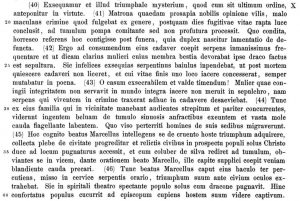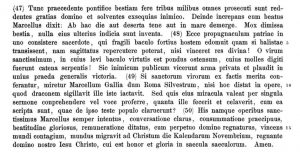| Saint and Dragon | Date of Text | Citation | Text/edition | Language | Translation |
| Marcellus of Paris and a tomb dragon | late vi AD | Venantius Fortunatus Life of Bishop Marcellus of Paris 10, pp.53-4 MGH | MGH Auctores Antiquissimi iv.2, 49-54; BHL no. 5248 | Latin | DSS no. 151 |


Translation:
Let us narrate too that glorious divine achievement of his that, for all it may be last in order, we place first in virtue. There was a certain matron of high family but low repute, who stained her shining stock with base sin. After the light was taken away and she brought the days of her fleeting life to an end, she was carried out to her tomb with an accompanying (though profitless) procession. What happened after she had been laid in this tomb, and after her funeral rites, I shudder to relate, because it gives rise to a double grief over the dead woman. Anyway, a most enormous serpent [ serpens ] began to visit in order to devour her body, and, to speak more plainly, the dragon [ draco ] itself became the burial place of the woman whose limbs the beast was devouring. The serpentine pallbearer appropriated her luckless obsequies in such a way that her corpse was not permitted to lie quiet. Although the ending of her life had permitted her to lie in one place, she was ever being transported around in punishment. What an accursed fate, truly to be dreaded! A woman who had not maintained her integrity towards her husband when in the world did not deserve to retain the integrity of her body in the tomb. For the snake, which had drawn the woman into sin when she lived, continued its cruelty against her corpse. Then the members of her family that remained in the city heard a loud noise, ran together and saw the huge beast coiling its way out of the tomb and gliding along with its vast bulk and its tail whipping. The people were utterly terrified by this and moved out of their homes. On learning this, the blessed Marcellus, knowing how to triumph over the foe, walked forth from the city, the people thronging around him. Then, leaving them at a distance, whilst remaining in their plain sight, he came to where it was his purpose to fight, with Christ as his guide. And when the snake returned to the tomb from the wood, coiling about to meet itself by turns, Marcellus uttered a prayer. The snake began to beg for forgiveness with its head inclined in supplication and its tail making blandishing gestures. Then the blessed Marcellus struck its head three times with his crosier, put his handkerchief on the serpent’s neck, and dragged the object of his victory out before the eyes of the citizens. Thus before the gaze of this audience of the theatre of the spirit he fought alone against the dragon. Thence the people, reassured, ran up to the bishop, eager to see his captive enemy. With the priest leading a host of around three thousand, all followed him, giving thanks to the Lord and performing funeral obsequies for the foe [ sc. in so far as the procession resembled that of a funeral]. Then the blessed Marcellus chided the snake and said, ‘From this day forth either go and live in the desert, or plunge yourself into the sea.’ With the beast immediately dispatched, no trace of it was ever found again. Lo, to think that the protection of the land depended upon a single priest, who overcame the foe with his insubstantial crosier more bravely than if ballista darts had been fired, for the wounded creature could have struck back at him if the divine principle had not vanquished it. O most saintly man, through whose light crosier the weight of virtue was shown, whose gentle fi ngers formed the serpent’s chain! Thus the weapons of an individual prevailed over a public enemy, and a victory for all was celebrated over the prey taken by a single man. If one were to compare the deserving achievements of saintly men on the basis of their deeds, Gaul would hold Marcellus in admiration, just as Rome does Silvester. The only difference in their achievements is that the latter put a seal on his dragon, whereas the former drove his hither and thither. But who would have the strength to enumerate his miracles one by one in speech, or to bring forth in voice all the things he did without public knowledge, when the brilliant things he achieved before witnesses have already been recorded? For by these deeds the most saintly Marcellus, ever attentive, brilliant in conversation, outstanding in his achievements, glorious in his blessedness, rich in reward, destined to reign for eternity alongside the Lord, overcoming the uncleanness of the world, in his cleanliness passed over to Christ on the calends of November, in the reign of our Lord Jesus Christ, whose is the honour and the glory, the virtue and the power, throughout all ages of ages. Amen.